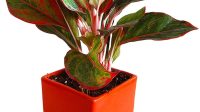
Aglaonema Silver Bay is one of the most beautiful houseplants in the world that has made food lovers love the world with its silver-green leaves and easy-looking care. This gorgeous cultivar is one of the most popular Aglaonema types, known for its unique appearance and strong growth. Because it is so resilient and adaptable, it is perfect for new and experienced plant owners. Of course, Silver Bay can be an excellent fit for any number of indoor conditions, but combines this functionality with ageless beauty. So if you are looking for a “Aglaonema Pictum Tricolor for sale” or scouring the internet on how to up your plant game with Silver Bay, here is a complete guide to care for and enjoy this amazing plant.
1. Discovering More about Aglaonema Silver Bay: An Elegant yet Rare Choice
The unique look and low-maintenance nature of Aglaonema Silver Bay is what makes the plant so popular. With its silvery-green foliage splashed with soft green margins, this plant will make your home more elegant and peaceful. It then becomes quite a stunning and rare collectible for plant collectors.
2. How to Identify Aglaonema Silver Bay
Silver Bay is distinguished by large, wide leaves featuring a silvery-green center and darker green edges. It grows in an erect, bushy shape, and is an ideal feature — i.e. centerpiece — to indoor gardens. What makes it stand out is its lush growth and capacity to keep its foliage exciting even when conditions could be better.
3. Aglaonema Silver Bay vs Aglaonema Pictum Tricolor
Both types have their own uniqueness in appearance and care, as both of which are rare and eye-catching plants. Silver Bay has an even silvery-green fade, Pictum Tricolor has a camo pattern with lots of green shades. Both belong in the plant collection in their own right but provide a very different look!
4. Aglaonema Pictum Tricolor For Sale: Where To Buy
This makes spotting particularly unique Aglaonema sensitive-plant-like Pictum Tricolor and Silver Bay pretty tough to find. Find healthy specimens from reputable online plant shops, specialty nurseries, or plant enthusiast communities. Get a good care guide from the seller to maintain the health of your plant.
5. Light Requirements of Aglaonema Silver Bay
Silver bay lives well in low to medium indirect light, so it can fit pretty much anywhere indoors. Keep it out of direct sunlight, which can burn its leaves, and put it in bright indirect light to keep its colors vibrant. It is great to add to shaded corners or offices with limited sunlight.
6. Silver Bay WateringMethods for Correct Growth
It is important to Silver Bay to keep the proper moisture level. Water when the top inch of soil feels dry but never let the plant sit in water. To avoid root rot make sure to plant in a pot with drainage!
7. Aglaonema Silver Bay prefers a well-draining, rich potting soil with organic substances.
Silver Bay prefers potting soil and also, perlite, soil with potting mixture and peat moss. Combined, this creates fantastic drainage whilst still holding just the right amount of moisture for the plant to thrive. Well-draining soil will keep water from standing in the pot to help keep the roots healthy.
8. The Initial Design Conditions for Silver Bay
Aglaonema Silver Bay loves hot and humid climate. Try to keep the temperatures between 65°F and 80°F (18°C–27°C) and humidity levels over 50%. If you need to up the humidity, then use a humidifier or cluster those plants together!
9. Aglaonema Silver Bay fertilization
Every 4-6 weeks in the growing season (spring and summer) feed Silver Bay with a balanced, water-soluble fertilizer. Excepter to not over-fertilize, since excess can add up to getting salt in the dirt, ruin the roots.
10. How to Prune and Shape Your Silver Bay Image
Regular clipping maintains the shape of the plant and helps bushier growth. Use sterilized scissors to cut off all sick/ yellowish leaves so that the plant looks clean and free from any disease.
11. Respotting Aglaonema Silver Bay: When to repot Aglaonema Silver Bay and How to do it
Silver Bay needs to be repotted once every 1-2 years for refreshed soil and root space. Use one size larger pot, fill it with fresh substrate so that the roots grow new.
12. Dealing Common Pests of Aglaonema Silver Bay
Although fairly resistant to pests, this plant may on occasion draw a few spider mites, mealy bugs or aphids, especially if kept indoors. Check under the leaves from time to time and treat pests immediately with insecticidal soap or neem oil.
13. Common Aglaonema Silver Bay Problems and How to Fix Them
Common issues include:
– Wilting – Caused by over-watering or poor drainage.
-> Wilting Leaves: A sign of either being underwatered, or a lack of humidity.
Sparse Growth: Solved by sufficient light and proper fertilising
14. Aglaonema Silver Bay as a Home Decor Plant
The beauty of Silver Bay makes it great for decor. Set it on a pretty plant stand, in an ornate pot, or use it as a statement piece on a side table. The silver-green foliage of this is suited for both modern and traditional settings.
15. Aglaonema Silver Bay: Why this should be on your plant-list
Silver Bay combines all these qualities into great looks, strength and easy-care. Its bold leaves and versatility make for a great addition to any selection from collectors or those looking for a little more interesting and hardy plant.
In Conclusion — The Undiminished Appeal of Aglaonema Silver Bay
Aglaonema Silver Bay is one of beautiful and amazing varieties of Aglaonema Among indoor plants. With silvery-green leaves, it lends a touch of elegance wherever it lives, and its easy care makes it a good choice for gardeners of all levels. Silver Bay is a solid selection whether it be for rare Aglaonema types such as Pictum Tricolor or simply to elevate your indoor garden! This guide has everything you need to help your plant grow nicely, keeping the beauty and happiness in your home for a long time.






